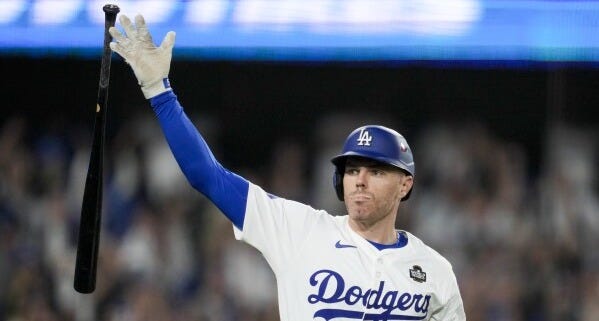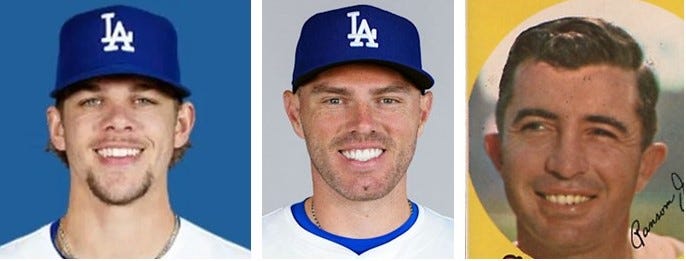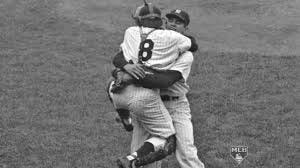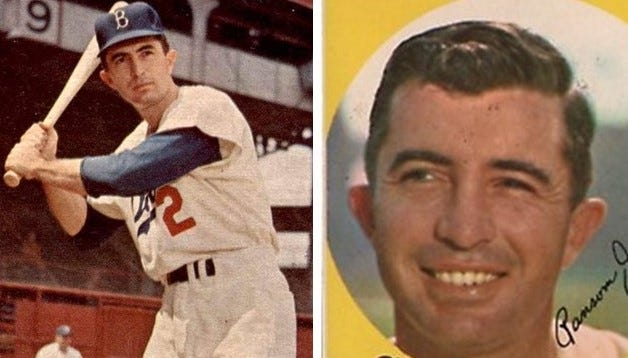Backroads and Ballplayers #78
Stories of the famous and not-so-famous men and women from a time when baseball was "Arkansas' Game." Backroads and Ballplayers Weekly is always free and short enough to finish in one cup of coffee.
Final World Series Thoughts - Gavin Stone’s Ring, Yanks vs Dodgers, and the Lost Story of Handsome Ransom Jackson
Sometime next year the 2024 Los Angeles Dodgers will get a World Series ring. Gavin Stone from Lake City, Arkansas, will be in that line, and all of his supporters in Arkansas will share in the excitement of his accomplishment. That home-state pride will be especially true at Riverside High School and the University of Central Arkansas.
I hope the fact that he was unable to pitch in the World Series never detracts from the satisfaction he feels when he looks at that ring. Stone was the Dodgers’ most reliable starting pitcher for the first five months of the season. When injuries decimated the pitching staff, he was at his best.
His June 26 start against the White Sox in Chicago was one of big-league baseball’s most efficient pitching performances of the season. In that 4-0 win, Stone came within four pitches of what we now call a “Maddux” (a nine-inning shutout that requires less than 100 pitches).
In his first full major league season, Stone went 11-5 with a 3.53 ERA. He led the team with 25 starts and pitched 140.1 innings, which also led the Dodgers’ staff. Stone struck out 116 batters and was destined to be near the top of the Rookie of the Year vote, when his season ended in late August.
In mid-October, the Dodgers announced that Stone had right-shoulder surgery on October 9. The procedure performed by respected surgeon Dr. Neal El Attrache puts his 2025 season in doubt. All of us back home expect him to make a complete recovery. He is our guy!
Link to Gavin Stone story in Only in Arkansas
2024 - Freddie Freeman’s World Series

As sometimes happens…maybe more than sometimes, the World Series media’s plans and the way the series actually plays out are two very different stories. The hype ahead of the 2024 series billed it as the Ohtani/Judge series, but neither probable league MVP made the headlines.
Aaron Judge, who batted .322 for the year, hit .222 in the series. Although he seemed to find his swing later in the series, he failed to come through in some big moments.
Shohei Ohtani batted .105 without a home run nor an RBI. He had one extra base hit, a double in Game One. To be fair, Ohtani may have been hampered by an injury to his shoulder on an attempted steal in Game Two. His big TV moment came in Game One, when the live cameras focused on him celebrating as he bounded from the dugout during Freddie Freeman’s walk-off home run trot.
It was no surprise to me, or probably most of you, that Freddie Freeman and Tommy Edman turned out to be a big part of the story of 2024. If you are a Cardinal fan, you love(d) Edman. He played everywhere, he was a team guy in every sense of the word, and in the predictable Cardinal tradition, he was traded.
Freddie Freeman was all those things in Atlanta except traded. His story in the 2024 postseason is the stuff of those historic baseball tales when an injured hero comes through in the clutch after it looked like he might not be able to play at all. Series MVP, Freeman, batted .300 for the series, hit four home runs, and drove in 12 of the Dodgers 25 runs. We woke up Halloween morning celebrating the success of one of major league baseball’s most respected players.
The video clips created to highlight Judge and Ohtani joined the Halloween candy wrappers in the trash of the TV production truck.

Of course the Dodgers/Yankees matchup brought back memories of the days when the two historic franchises were about 20 miles apart in rival boroughs of New York City. I have several vivid memories of those fall matchups. Some may be accurate; some are likely built around a collage of snippets in my mind.
The 2024 World Series was the sixth Fall Classic that featured a matchup between each league’s home run leader and the first since 1956. In that memorable series Mickey Mantle and Duke Snider opposed each other in a subway series between the Dodgers and the Yankees.
In one of my favorite childhood memories, I watched part of Don Larsen’s perfect game in Game Five of the1956 World Series on a TV in the window of J. T. Greer and Son furniture store in Ozark, Arkansas. I did watch World Series games from that location, but since Game Five was played on a Monday, and I was only eight-years-old, I was probably at home on West View Mountain.
We almost always made our shopping trips on Saturday, and before we had TV at home, I spent the laundry time, grocery time, and other shopping obligations in front of Greers. There was usually a small crowd in front of the store window on those Saturdays. I do remember the old men in overalls, a few kids about my age, and an occasional mom carrying a paper bag of something, but I do not remember any specific games. I fear I more likely watched my Yankees losing to the Pirates in 1960. I hope not!
The Lost Story of Ransom Joseph Jackson
The battle of Snider and Mantle did materialize in 1956. Mick hit three home runs in the series and he made a backhanded catch of a line drive that may have saved Larsen’s perfect game.
Snider batted .304. He homered in Game Two to help the Dodgers erase a six-run deficit and even the series. He might have been the MVP had Brooklyn won the seventh game.
Yogi Berra might have been the most valuable player in the series but Larsen’s Game Five gem was historic. Larsen had to win the World Series MVP Award. Yogi batted .360 for the series. He hit three home runs and batted in 10 runs. The 1956 World Series was Yogi Berra’s finest hour, and although he was chosen American League MVP three times, Yogi never won a World Series MVP Award.
“Handsome Ransom Jackson”
Looking back at 1956 gives me a chance to tell a lost story about an Arkansan who played inconspicuously in that historic Fall Classic. His name was Ransom Jackson. He grew up in Little Rock, Arkansas, excelled at golf and learned to hit in a game that involved a backyard league and rolled up socks.
Sportswriters like to call him “Handsome Ransom Jackson,” but it is highly unlikely that his teammates called him Handsome in the dugout. His baseball name was Randy Jackson and his story is lost from the decade that saw the debut of Mickey, Willie, and the Duke.
Nicknames are an integral part of the culture of professional baseball and perhaps one of the game’s most colorful characteristics. When it comes to baseball monikers, one thing is abundantly clear. There is no warm-fuzzy empathy that protects players from alternate identities related to their personality and appearance.
There have been dozens of big leaguers called “Slim,” “Slats,” and “Skinny,” and a few tagged as “Fatty,” “Runt,” and “Pudge.” Players simply called “Lefty” number in the hundreds, but “Righty” seldom sticks as a nickname. Dizzy Dean was not the only major leaguer with an alternate name based on some erratic behavior. There have actually been several other “dizzy” big leaguers, and a 1970s pitcher known for his unpredictability was given the more contemporary sobriquet, “Spaceman.”
With an abundance of descriptive nicknames, Jackson’s sportswriter-given title stands alone. “Handsome” Ransom Jackson is indeed unique. The only thing about Jackson more singular than the title Handsome Ransom is Jackson’s route to the 1954 Major League All-Star Game.
The major league baseball All-Star known generally as Randy Jackson had an excellent big-league career. In 955 games, Jackson collected 835 hits, 103 home runs, and 415 RBIs, playing for the Cubs, Dodgers, and Indians. While his pro baseball career is noteworthy, the series of events that led him from Little Rock, Arkansas, to baseball’s highest level is one of the most unlikely stories in baseball history.
Ransom Jackson Jr. was not called “Handsome” when he was a kid. In fact, in his Little Rock neighborhood, his buddies likely called him Randy. The catchy “Handsome Ransom” title was given to Jackson somewhere in the minor leagues on his way to the Cubs.
Ransom Joseph Jackson Jr. grew up in a middle-class neighborhood in Little Rock, Arkansas. His home was conveniently located a few blocks from Lamar Porter Field where a youngster with baseball talent could develop his skills, aided by experienced coaches. While Lamar Porter was the home of a nationally competitive American Legion team known as the Doughboys, Jackson played in an alternate league.
He chose an unusual youth league in his part of the city that played a modified game with a broomstick and a sock wrapped with electrician’s tape. The league featured an official schedule, concessions, and a league title. While the sock ball games were a popular attraction in the neighborhood, the game may not have been a reliable preparation for big-league baseball.
His high school did not offer football, so Ransom Jackson and his pals played a modified punting game sometimes known as “setback.” Teams kicked the ball from where they caught it until a team scored on a punt that crossed an established goal line. While the punting game was popular on many playgrounds, it may not have been the suggested route to Southwest Conference football.
In his youth, Ransom Jackson’s chosen sport was golf. His dad taught him the game, and young Jackson had obvious talent. By his teen years, he was making sports page headlines as a golfer with little interest in a future that included football and baseball. His love of golf would always be part of Jackson’s life.
When World War II motivated young men to enter military service, Jackson chose a Navy flight training program at Texas Christian University recommended by his father. At TCU, a series of events Jackson called “accidental” began when he met legendary football coach Dutch Meyer. Players were in short supply and Jackson at least looked like an athlete, so Meyer encouraged him to join the TCU football team during the spring practice of 1944. Although he lacked any formal experience, his punting-game background earned him a spot as the backup punter.
After the regular punter was injured in the first game, Jackson inherited the job. By mid-October, injuries had decimated the Horned Frogs’ backfield to the point that Jackson also became a starter at half-back on both offense and defense. The legendary 1944 Horned Frogs football team went 7-3-1, won the Southwest Conference title, and earned a trip to the Cotton Bowl. Meyer’s good fortune led the coach to recruit Jackson for the TCU baseball team he also coached. Jackson recalled later that he, “. . . surprised Coach Meyer and myself by leading the Southwest Conference with a .500 batting average.”
When his flight training required him to transfer to the University of Texas in the fall of 1945, Jackson continued to excel at both football and baseball with the Longhorns. He played in another Cotton Bowl with Texas in 1945 and led the SWC in batting average in both of his baseball seasons with the Longhorns.
Shortly after his graduation in the spring of 1947, Jackson was recruited by the Conroe Wildcats for a high-level semipro team that paid $400 a month. The team won the state semipro title, and, as a result of the attention he got playing for Conroe, the Cubs brought him to Wrigley Field for a tryout. In a batting session, the Cubs pitted Jackson against major league pitcher Russ Meyer. Jackson recalled, “It was one of those days when everything clicked. Line drives were flying all over the place.” The Cubs were impressed enough to sign Jackson for an annual salary of $6,000.
Jackson hit .300+ in two minor league seasons before making the Cubs’ Opening Day roster in 1950. He appeared in 17 games in April and May, and another 17 in September. Although he hit only .225 in his 111 at-bats, Randy Jackson was in the big leagues to stay.
As the regular third baseman in 1951, Jackson hit .275 for the last-place Cubs, led the team in stolen bases, and was second on the club in home runs and RBIs. The success of his rookie year gave way to reality in a big drop-off in 1952. Jackson, whose batting average fell to .232, attributed his decline to his failure to adjust to the way he was being pitched. “They discovered my weaknesses and were taking advantage of them.”
Jackson was back on track in 1953 with a .285 batting mark and 19 home runs. With his confidence restored, he began the 1954 campaign right where he left off the previous season. He was named to his first All-Star team in July, and he hit his 19th home run on July 22nd. It would be his last home run for the year. An infected hand led to a dramatic decline in his hitting success that resulted in a 37-point decline in his batting average after the All-Star Game.
Jackson made his second consecutive All-Star squad in 1955. He was second on the Cubs to the great Ernie Banks in most offensive categories, including home runs, RBIs, and on-base percentage.
While Jackson liked his teammates in Chicago, when the Cubs traded him to the Brooklyn Dodgers on December 6, 1955, he was optimistic about a new start with a pennant contender. “If I had asked to be traded, the Dodgers were the team I would’ve picked.”
Although he was only 30 years old, Jackson’s best years were behind him. A series of setbacks, including a knee injury, a spider bite, and a cut from a doorknob, not only limited his playing time but ultimately affected his performance. On the next to last game of the 1957 season, Jackson hit a three-run home run against the Phillies in Connie Mack Stadium. It would be the last home run hit by a Dodgers player while the team represented Brooklyn.
Jackson played in only 35 games for the Dodgers after their move to Los Angeles in 1958. He managed to get in 32 games with the Cleveland Indians after the Dodgers traded him in August of 1958. The Indians sent him to the Cubs in May of 1959 where he played the last 41 games of his career for the team he had joined as a rookie 10 years earlier. He was released in October 1959.
Ransom Jackson played in another time. He starred in an era when a gifted athlete, without a single game of high school experience, could become a football star in the Southwest Conference. As a baseball player, he led the SWC in hitting for three consecutive years and became a major league baseball All-Star after learning to hit in a sock-ball league.
Ransom Jackson died in Athens, Georgia, on March 20, 2019. He was 93 years old.
Book ordering information: Link
Welcome new subscribers. Have you missed some posts? Link - https://jyeager.substack.com/










